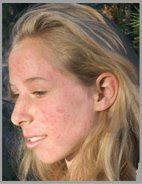How to Stop Acne
Post-acne Blemishes and Scars – Part 2
Copyright © Zion
Acne Scars
The most important reason for treating acne early and effectively is that permanent scarring can occur if the inflammation is left too late. Acne scars, unlike post-acne redness and pigmentation, are permanent.
Unfortunately, current treatments for acne scars are costly, and only partially improve the scars. Scar treatment should only be considered for patients whose acne is well controlled dormant.
The Two Main Types of Acne Scars and their Treatment is as follows:
Depressed Acne Scars
These are the most common acne scars. They vary in appearance and depth. Dermatologists classify them as ice-pick scars (narrow, deep-pitted scars) box-car type scars (round, oval depressions with sharply demarcated vertical edges) and rolling scars (scars causing the skin to take on an undulating appearance) to fine-tune techniques of improving them. Most patients display a combination of the different types of acne scars.
How to Stop Acne
Total removal of acne scars is not possible but the following treatments may improve the appearance of depressed scars by making them shallower and their margins less distinct.
Scar Revision
Scar Revision (surgery) is necessary to improve the appearance of deep scars, for example, ice pick scars be cut-out (excised) and the skin stitched back to close up the scar. The procedure is usually performed under local anesthesia and several sessions may be needed. Scar revision results in a shallow scar than originally; residual scars can subsequently be further improved by other non-surgical techniques.
Treatments for Acne Scars:
- Surgery
- Ablative Laser Resurfacing
- Non-ablative Laser Treatment
- Chemical Peeling
- Filler Injections
- Dermabrasion
How to Stop Acne
Tuesday, September 9, 2008
Wednesday, September 3, 2008
How to Stop Acne - Post-acne Blemishes and Scars – Part 1
How to Stop Acne
Post-acne Blemishes and Scars – Part 1
Copyright © Zion
Even after the active acne has subsided, post-acne blemishes may remain, including redness, pigmentation and scarring. These are more pronounced in poorly treated acne, or after self-manipulation like picking and squeezing. These blemishes often cause patients much concern and distress long after the active acne has subsided.
Post-acne Redness
After the inflammatory acne subsides, the area often turns a little red. This is normal, although it may last weeks to months for some patients. The redness results from the fine blood vessels that occur under the skin as part of the normal healing process, and appears more pronounced after the patient has been out in the sun on a hot day, and after he has used certain creams that may irritate the skin, such as topical tretinoin.
There are no creams that will effectively make the redness go away faster, although daily application of a sunscreen, sun protection (like hats), and avoidance of aggravating factors to will minimize it. The good news is that post-acne redness clear on its own and patients is all that is required. However, for those who are disturbed by the redness and want it to clear faster, the vascular specific laser – pulsed dye laser, or intense pulse light (IPL) therapy – may speed up the process. However, several sessions may be needed and treatment is often costly.
How to Stop Acne
Post-acne Pigmentation
For some patients, there may be pigmentation over sites of previous inflammation. The tendency to form pigmentation varies between each individual, although deeper and larger acne tends to leave more pigmentation as compared to more superficial and smaller lesions. The pigmentation may be aggravated by picking and squeezing, and by the use of certain oral medication such as the antibiotic minocycline.
Currently available lightening creams are only minimally effective in hastening the clearance of post-acne pigmentation, which can be rather deep. However, the pigmentation will gradually clear over the following weeks to months, and patients should concentrate on controlling their acne to minimize further post-inflammatory pigmentation. Chemical peeling, intense pulse light (IPL) therapy, and lasers should be avoided as they offer no additional benefit, and may in fact injure the skin and cause further pigmentation.
How to Stop Acne
Post-acne Blemishes and Scars – Part 1
Copyright © Zion
Even after the active acne has subsided, post-acne blemishes may remain, including redness, pigmentation and scarring. These are more pronounced in poorly treated acne, or after self-manipulation like picking and squeezing. These blemishes often cause patients much concern and distress long after the active acne has subsided.
Post-acne Redness
After the inflammatory acne subsides, the area often turns a little red. This is normal, although it may last weeks to months for some patients. The redness results from the fine blood vessels that occur under the skin as part of the normal healing process, and appears more pronounced after the patient has been out in the sun on a hot day, and after he has used certain creams that may irritate the skin, such as topical tretinoin.
There are no creams that will effectively make the redness go away faster, although daily application of a sunscreen, sun protection (like hats), and avoidance of aggravating factors to will minimize it. The good news is that post-acne redness clear on its own and patients is all that is required. However, for those who are disturbed by the redness and want it to clear faster, the vascular specific laser – pulsed dye laser, or intense pulse light (IPL) therapy – may speed up the process. However, several sessions may be needed and treatment is often costly.
How to Stop Acne
Post-acne Pigmentation
For some patients, there may be pigmentation over sites of previous inflammation. The tendency to form pigmentation varies between each individual, although deeper and larger acne tends to leave more pigmentation as compared to more superficial and smaller lesions. The pigmentation may be aggravated by picking and squeezing, and by the use of certain oral medication such as the antibiotic minocycline.
Currently available lightening creams are only minimally effective in hastening the clearance of post-acne pigmentation, which can be rather deep. However, the pigmentation will gradually clear over the following weeks to months, and patients should concentrate on controlling their acne to minimize further post-inflammatory pigmentation. Chemical peeling, intense pulse light (IPL) therapy, and lasers should be avoided as they offer no additional benefit, and may in fact injure the skin and cause further pigmentation.
How to Stop Acne
Subscribe to:
Posts (Atom)




